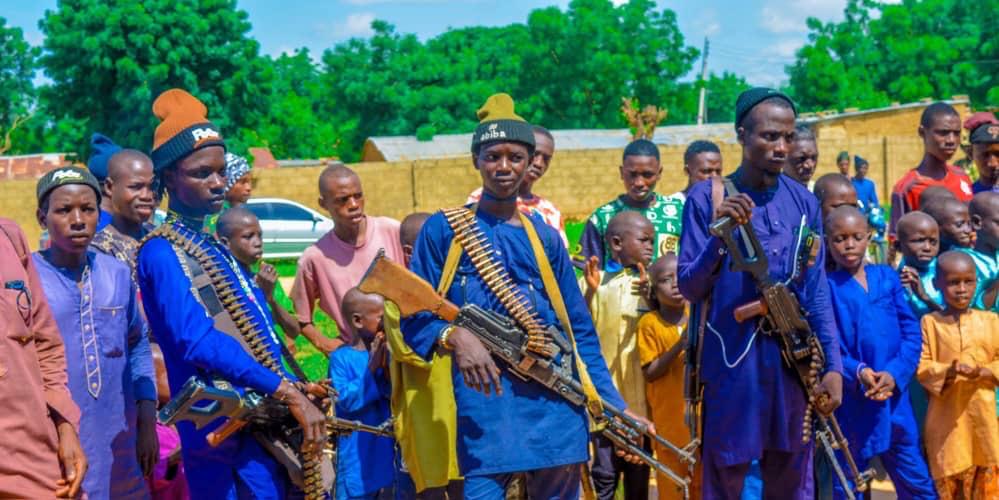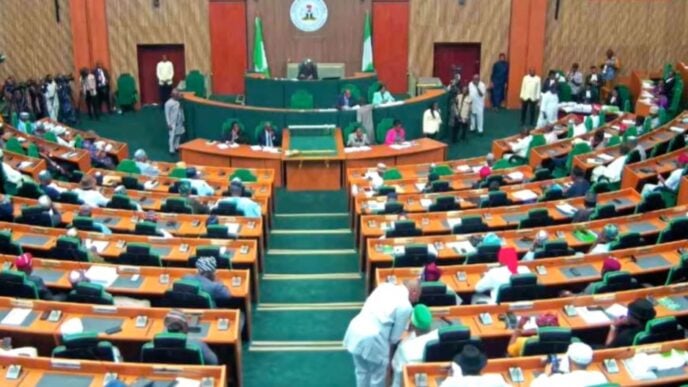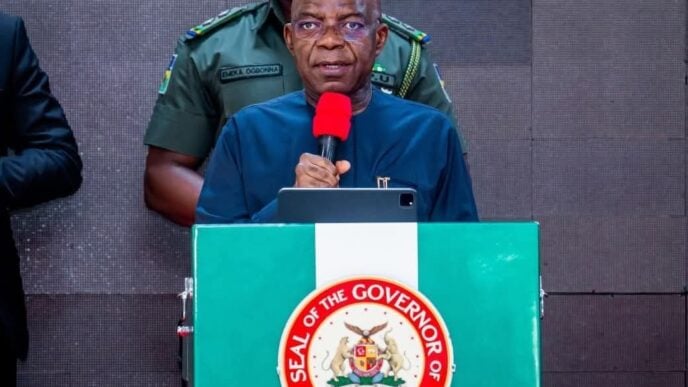Bandit group during peace talks in Katsina | File photo
The pathetic peace negotiations between bandits and communities in Katsina State in the past couple of weeks are a new low in the failure of Nigerian governments at all levels to protect its citizens. Yet, the 1999 Constitution of the Federal Republic of Nigeria (as Amended) inscribes safety of life and security as the primary responsibility of government. Here is what President Bola Ahmed Tinubu and Governor Dikko Umar Radda can do to redeem the coming catastrophe.
Clips and pictures of gun-toting gangsters calmly sitting among victims of their atrocities to achieve an armistice and reach reconciliation seem so surreal. Armed men in military fatigues sit side-by-side of district heads, imams and elders while government and security officials supervise the process. Reports from the negotiation rooms read like surrender sessions.
For instance a story in the Daily Trust of 30th August 2025 captioned “Another Katsina LG signs peace deal with bandits” informs that “Community leaders and bandits in Kurfi Local Government Area of Katsina State on Thursday signed a peace agreement marking a significant step towards ending years of violence, kidnapping and cattle-rustling in the region. The agreement brokered by the Maradin Katsina and district Head of Kurfi, Alhaji Mansur Ahmadu Kurfi and the Local Government Chairman, Babangida Abdullahi Kurfi took place at Wurma Forest, a hotspot for insecurity.”
Key leaders of the bandits in attendance, including Alhaji Usman Kachalla Ruga, Sani Muhindinge, Yahaya Sani and Alhaji Shuaibu pledged to cease hostilities, release captives and allow farmers to return to their lands without fear. In return, community leaders promised to work with the bandits to rehabilitate schools and hospitals and to ensure fair treatment of detained bandits.
Advertisement
The agreement made Kurfi Local Government the seventh in Katsina State to reach a peace deal with bandits following Jibia, Batsari, Safana, Danmusa, Sabuwa and Dandume local government areas of Katsina State who had earlier entered into a peace deal with bandits as part of efforts to address persistent attacks, killings and abductions. The so-called peace meeting was held at Kabalawa Dungun-Muazu, a community located in Sabuwa LGA. The chairmen of Sabuwa, Sagir Tanimu, and Dandume, Bashir Gyazama, were present at the meeting and were reported to have facilitated the agreement.
Crucial resolutions include that there should be a ceasefire, with bandits pledging to stop attacks on local communities. They were also granted free movement into towns and villages for trade and commerce, to enable the bandits to bring in and sell their livestock without fear of harm from residents. The bandits further agreed to release abducted victims, while requesting that the government secure the release of their captured members. Both sides also committed to working together to maintain peace and stability in the region.
The irony is that several bandits attended the meetings armed with automatic weapons, alongside their leaders: Idi Muwage, Alhaji Kabiru, Kachalla Rusku, Kachalla Murtala, Kachalla Mai Saje, Kachalla Dawa, Ardo Abdul-Salam Fatika and Alhaji Labi. The question is: How can those who only recently murdered, maimed, raped, displaced, roasted and robbed innocent individuals in the hundreds if not thousands turn into partners for peace while still bearing illegal weapons? Where is the justice for the widowed, the orphaned, the murdered and the mutilated? Peace is not just the absence of violence but rather justice, equity and institutional reforms.
Advertisement
Ado Alero, widely known for leading devastating massacres across Kebbi, Niger, Zamfara, Sokoto and Katsina States is even one of the warlords who publicly signed up on the so-called peace deal that has so far restored relative peace in parts of the latter state. Suddenly, strategic frontlines such as Batsari, Danmusa, Jibia, Kurfi, Matazu and Faskari are celebrating a false sense of security. Some residents even expressed belief that they feel more protected by the ‘repentant’ bandits who still walk about fully armed.
Scenes showing notorious brigands gleefully bringing back kidnapped children and women as if delivering stolen sheep are not just shocking and disgusting but downright demoralising. No armed band should over-ride sovereign security apparatus by returning captives at will and walking away without penalties for the proceeds of its putrid past. The optics is awful.
To boot, the ‘repentant’ bandits are expected to live freely among their erstwhile preys. Currently, many communities are under the protection of the bandits. Such peace deals can only institutionalise insecurity by showing that violence pays and notorious criminals can be rewarded with social status and material gains – an advertisement for the next generation of gangsters. Meanwhile, at least 55 persons were abducted in neighbouring Zamfara State within the same time-frame.
Reintegration without restitution is a reward for criminality. One kidnap kingpin even cited the arrest of some of his operatives as the cause for his increasingly ferocious attacks on communities. Kachalla Umar, one of the warlords in negotiations at Matazu, said if you kill ten or twenty bandits, 20 or 30 others will rise up in replacement. Localised deals will not work because of the fractured nature of bandits groups. Unlike Boko Haram, banditry is run by rival gangs and opportunistic cells that lack any central command.
Advertisement
These fragmented and fragile truces can only offer the peace of the graveyard. Moreover, moving from ‘no negotiations with bandits’ to broad daylight auction of atonement may mean more misfortunes down the road. Peace deals in the past only served to help the terrorist to re-arm and refresh, regroup and resume violence. If Governor Radda insist on no negotiation what is even the status of the community-brokered peace agreements? Memorandum of understanding between criminals and community leaders is tantamount to creating parallel centres of power by bandits who wield influence.
It is estimated that at least 12 out of the 34 local government areas in Katsina State are still under the effective control of warlords. So, some other mind-boggling questions arise. Why are these vicious vagabonds being spared if there is no truth that certain politicians plan on using them as enforcers and thugs to terrorise voters in coming elections? A Hausa proverb posits that a thief sent by his father does not proceed with stealth. He boldly announces his arrival.
With these peace deals, Katsina State has just muddled its position by not firmly repudiating banditry and by exhibiting a lack of coherent security strategy. It is intolerable to frame tenacious and temporary ceasefires as lasting peace. Silence is not synonymous with serenity; tactical manoeuvres cannot substitute justice and fleeting relief is not equal to enduring reconciliation. It inspires other factions to intensify their assaults in order to win their own deals. It normalises the outsourcing of security and other markers of sovereignty to criminals.
Ending banditry requires aggressive action to ensure that criminality culminates in imprisonment or execution as the law prescribes. Government must have the upper hand even while it gives room for forgiveness. Amnesty as a federal prerogative may be coordinated by Office of the National Security Adviser with clear legal backing and oversight. Rebuilding trust between security services and communities is indispensable.
Advertisement
Dismantling the financial and logistic networks of banditry often linked to powerful politicians is the path to sustainable peace. Amnesty must come with complete disarmament, demobilisation, restitution for victims, rehabilitation for recants and finally monitoring and oversight by independent bodies. Governor Radda should also invest more in community policing to serve as security buffers and intelligence posts in remote fringes of the state.
The legitimacy of the Nigerian state is at stake since it rests on its capacity to secure lives and property. President Bola Tinubu must re-assert the Federal Government’s monopoly of legitimate violence and the state’s capacity to ensure justice for all. Socioeconomic reforms are also seriously required to address the socioeconomic root causes of banditry such as extreme poverty, illiteracy and unemployment without rewarding those who profit from it.
Advertisement
Hassan-Tom writes from Abuja.
Advertisement
Views expressed by contributors are strictly personal and not of TheCable.











